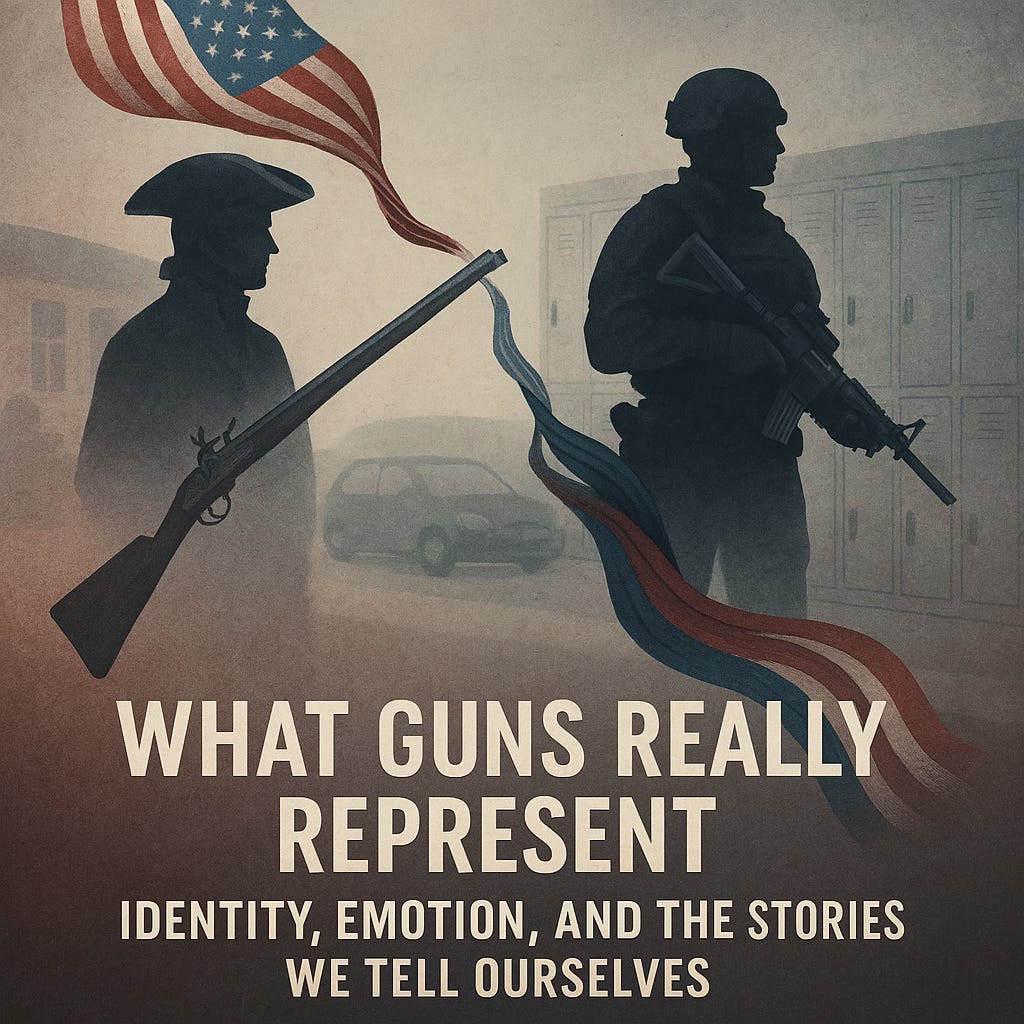From the THX Series Hub: Neurodivergence & the Founding of a Nation and THX Series Hub: Christian Nationalism vs Christian Patriotism
I still remember sitting in the school pickup line when a father, frustrated and ignored, reached into his truck and pulled out a handgun. He didn’t fire it. He didn’t even point it. But he made sure we all saw it.
That day, I wasn’t afraid of criminals or strangers—I was afraid of a fellow parent. Afraid that a disagreement would escalate into violence simply because a weapon was within reach.
My daughters have lived through multiple school lockdowns. Not drills. Real ones. One was triggered by an armed criminal spotted nearby. Another by a man who had reportedly threatened his workplace. Then came the day of a school shooting just miles from their high school—where the officer who fatally stopped the shooter turned out to be the fiancé of my daughter’s teacher. These weren’t moments of theory or debate. They were moments of fear—and of children waiting, hiding, hoping. Of parents tortured by uncertainty and helplessness.
And still, we’re told the only thing we can do is arm teachers, install metal detectors, or make children wear bulletproof backpacks.
A Brother, A Belief, A Mirror
One of my brothers is a staunch conservative and a proud gun owner. He believes in reason, responsibility, and the Second Amendment with the same fervor I hold for empathy and upstream change. In our debates, he often accuses me of “valuing emotion over reason.” The irony is: the mere suggestion that he might be moved by emotion seems to repulse him.
But here’s the thing—that reaction is emotional.
He’s not wrong to be moved. He just believes that emotions are beneath him—something he has mastered or transcended. And in that belief, he becomes exactly what he resists: someone driven by emotion, cloaked in the armor of rationality.
What Guns Symbolize—And Why That Matters
Let’s look beyond the headlines and into the hidden stories behind our stances. Using the THX frameworks—12 Utilities, PERMAH, Prospect Theory, and the Admiration Equation—we can see how different identities shape what people admire, what they fear losing, and what makes them feel safe or worthy.
For Many Conservatives, Guns Symbolize:
These aren’t abstract beliefs. They are identity-infused stories. Gun restrictions don’t just feel like inconvenience—they feel like personal diminishment. A loss of power. A betrayal of purpose.
Prospect Theory reminds us: people feel loss more intensely than gain. So a conservative doesn’t just hear “you might save lives by giving up some rights.” They feel, “You are trying to take away who I am.”
But What About Mental Health?
Conservatives often invoke “mental health” when trying to redirect attention after a mass shooting. But let’s be honest: it’s rarely followed by policy. There’s little investment in behavioral health, community services, or prevention. Why?
Because to many conservatives, mental health isn't seen as real—not unless it’s used to dehumanize someone.
They view spirituality as superior to psychology.
They conflate emotional regulation with moral strength.
They believe they can remain calm with a gun… and therefore so should everyone else.
This denial is often rooted in identity: if you see yourself as rational, moral, and God-aligned, then emotion becomes a threat to that identity—and must be rejected, even when it’s clearly in the driver’s seat.
Liberals, Loss, and the Long Game
Liberals aren’t emotion-free either. Their emotional wiring just orients differently:
Liberals tend to go upstream: asking why people become violent, advocating for systemic reform, investing in mental health care, and prioritizing the prevention of harm over the performance of heroism.
When conservatives talk about broken families and prayer in schools, they are responding to pain. But they rarely offer interventions that heal—just rituals that soothe.
Liberals, by contrast, tend to see healing as a public responsibility. Mental health is infrastructure, not a private burden. But that position is often painted as naïve or "soft"—when in fact, it’s strategically human.
So Where Do We Go From Here?
We’re not going to resolve the gun debate with better logic. Because logic isn’t what’s driving most of this. Identity is. And identity lives in our emotions, our fears, our need to feel worthy, admired, and safe.
I no longer try to convince my brother of my position. I try to understand who he is trying to be.
He wants to be the protector. The rational man. The last line of defense.
And I want to be the one who keeps the fight from happening in the first place.
Reflection Prompt for You
What story have you told yourself about who you are in a moment of danger?
What would it mean to be safe—without needing to be armed?

Interpretation:
This image captures the deep psychological and cultural split in America’s relationship with guns. On the left, a Revolutionary War figure symbolizes the founding mythos of liberty and resistance. On the right, a modern armed civilian reflects contemporary anxieties and fantasies of protection, control, and identity. The fragmented American flag that binds them represents both shared origin and divergent meaning—each half a mirror of hopes, fears, and moral framing shaped by loss, nostalgia, and the need to belong.






“he becomes exactly what he resists: someone driven by emotion, cloaked in the armor of rationality.”